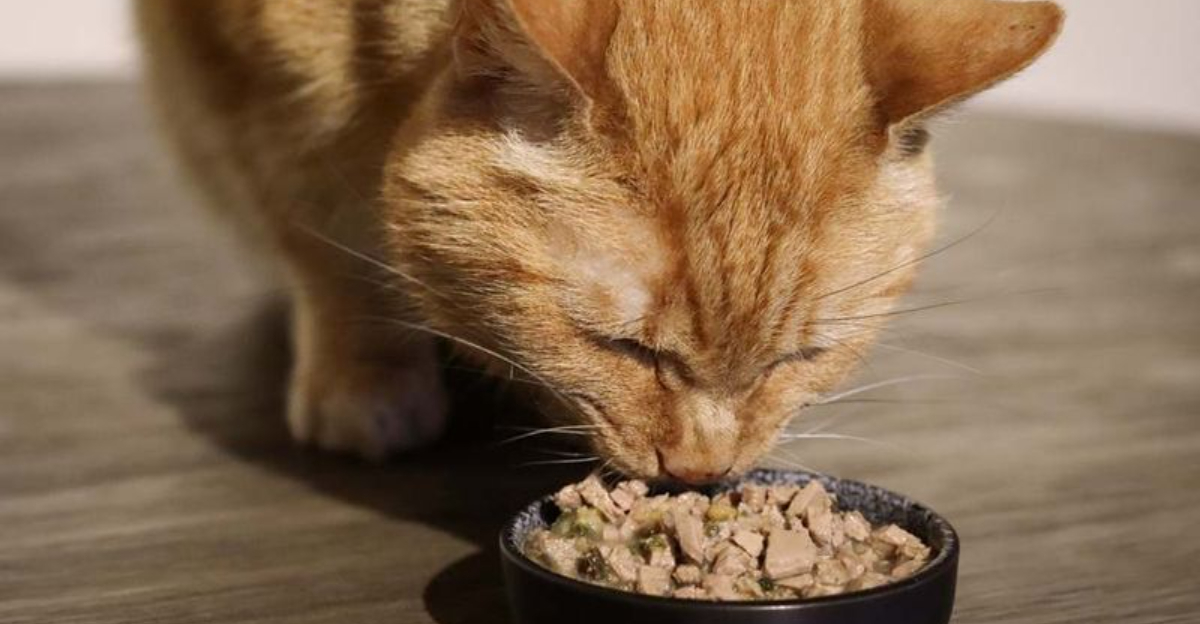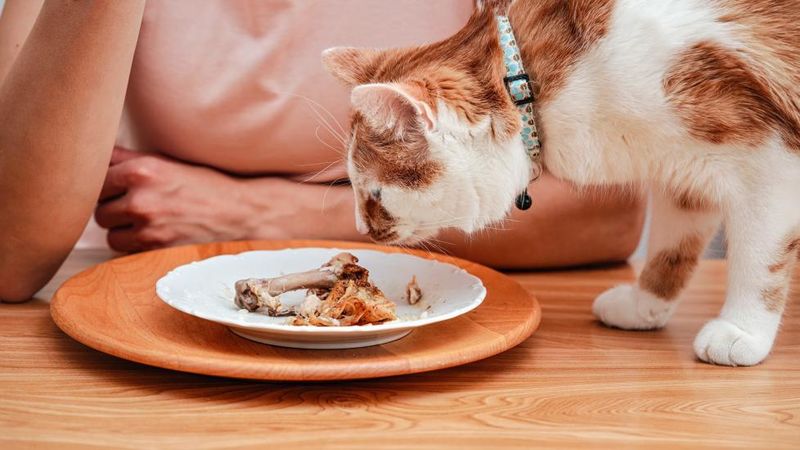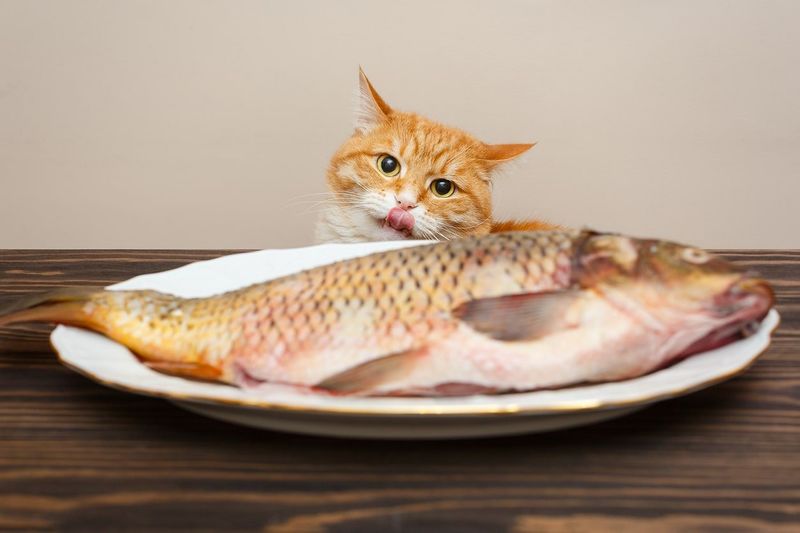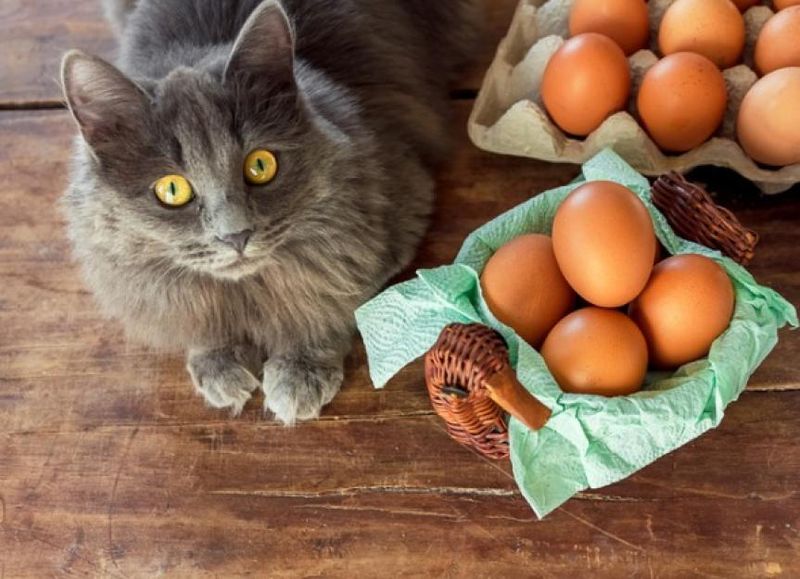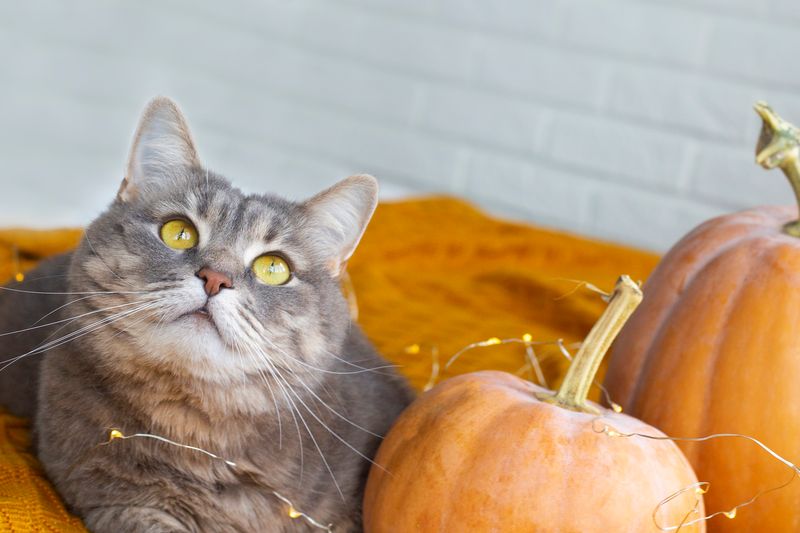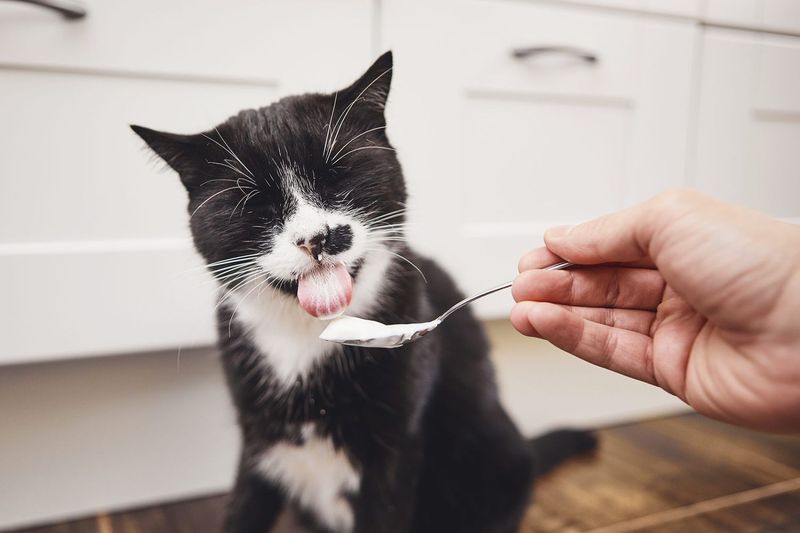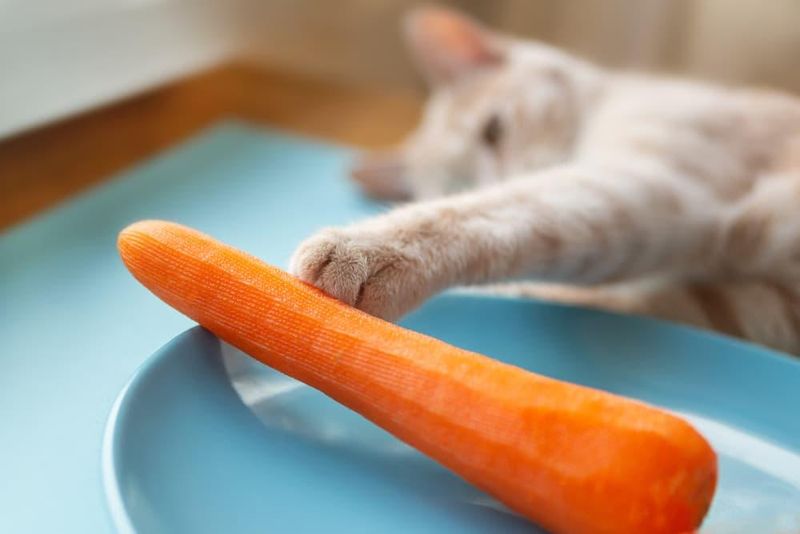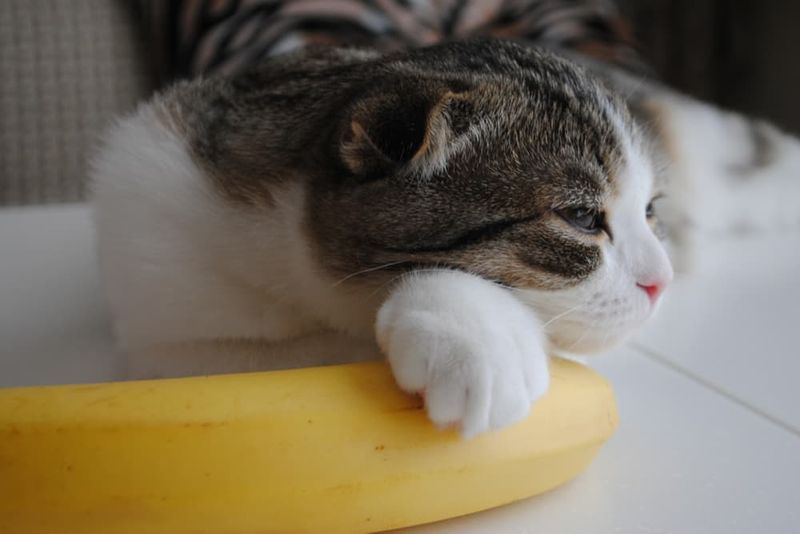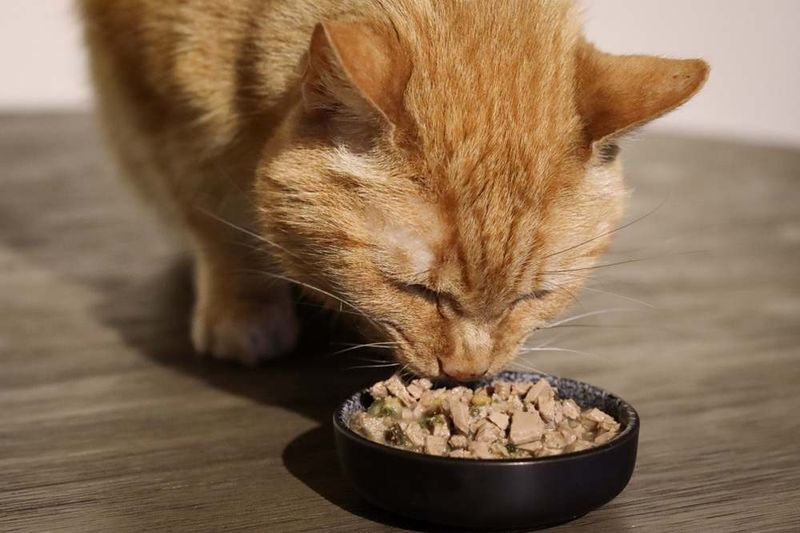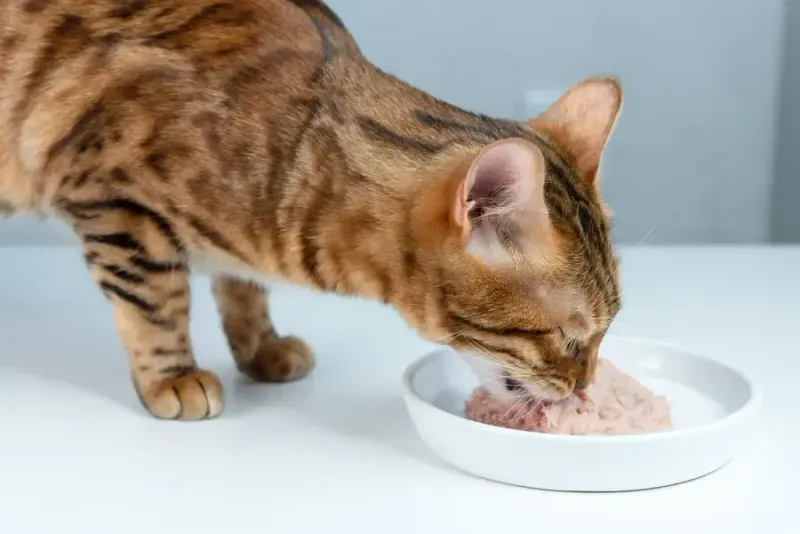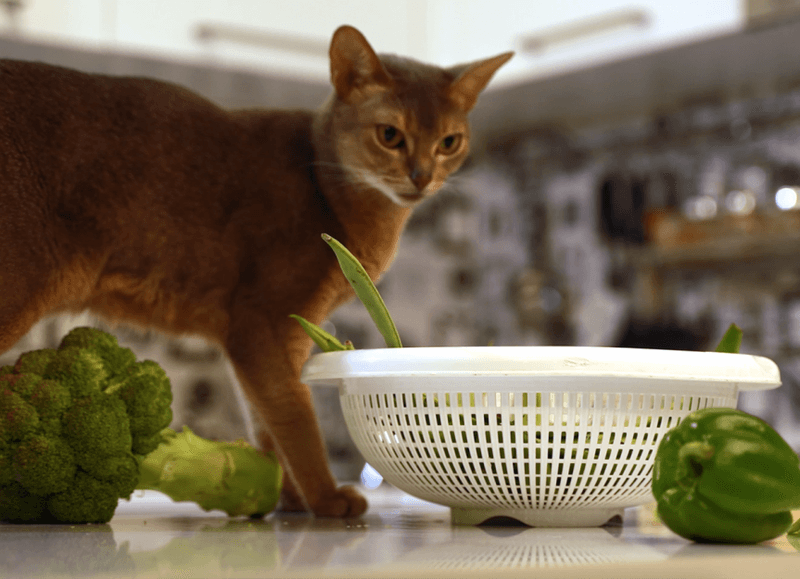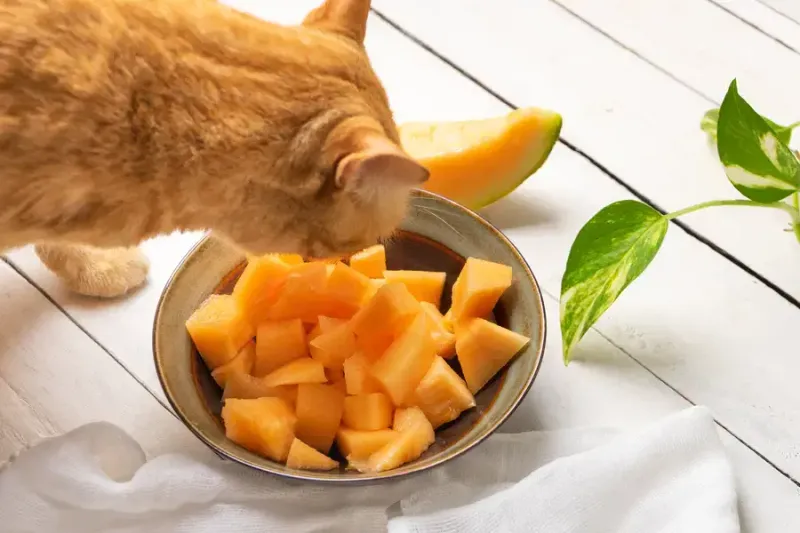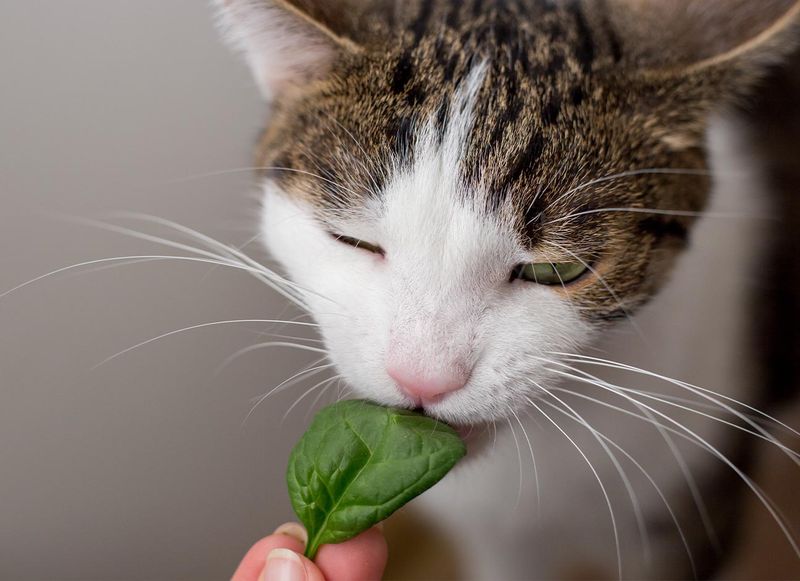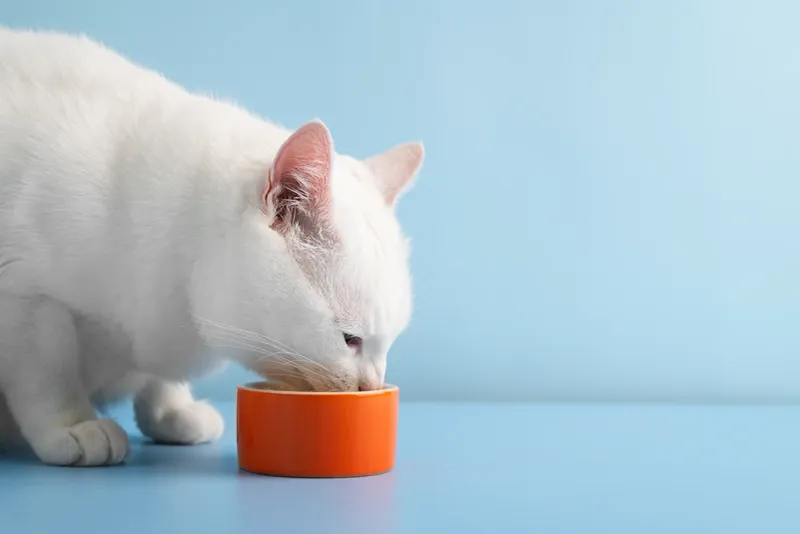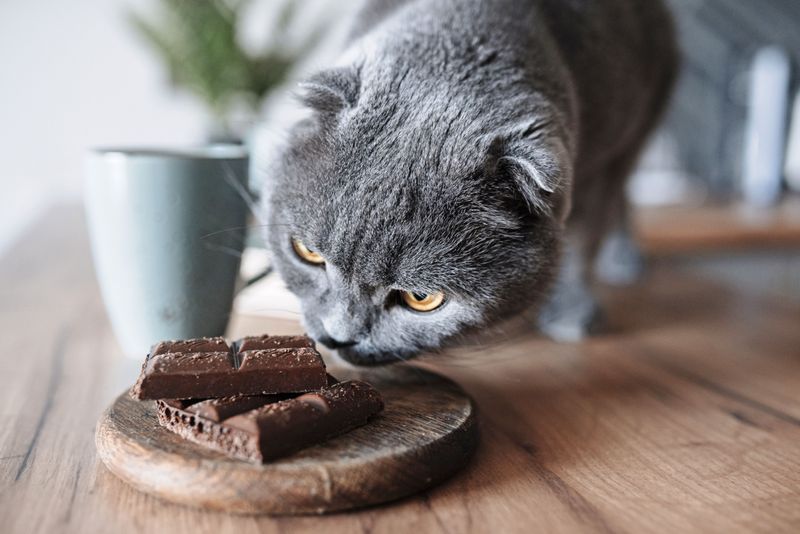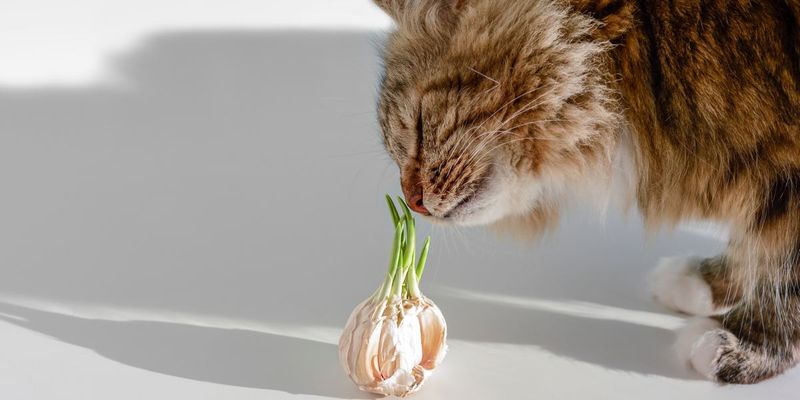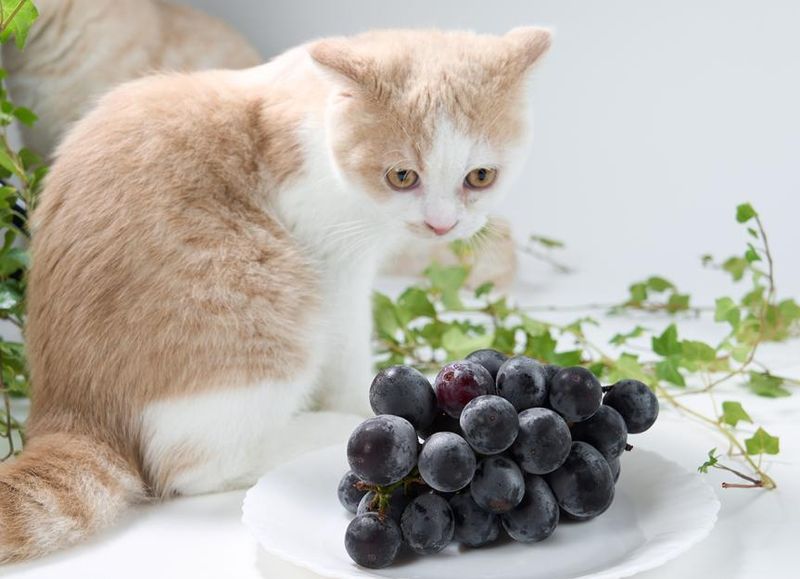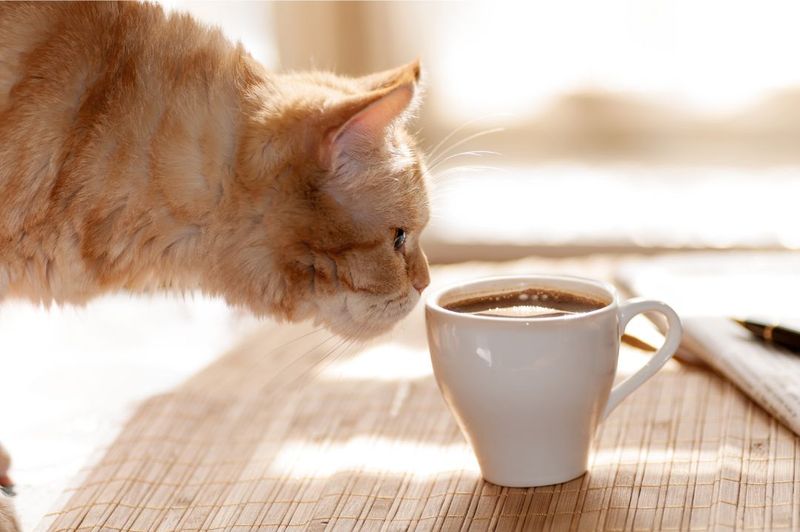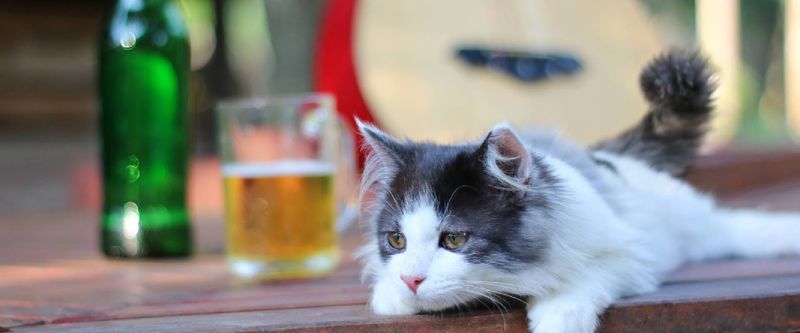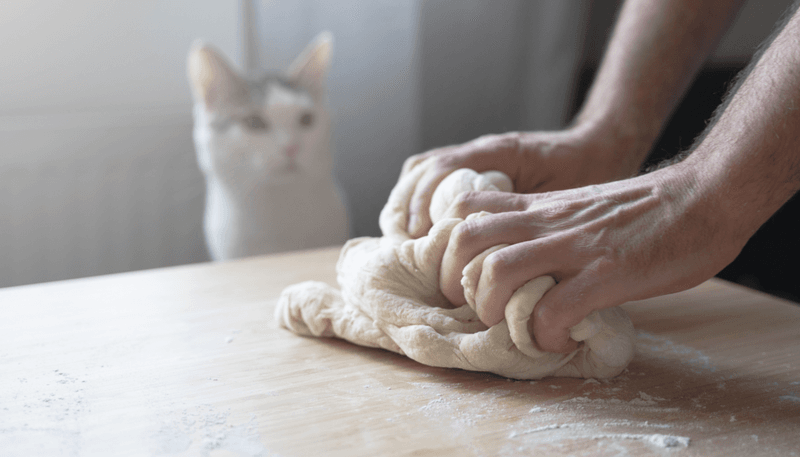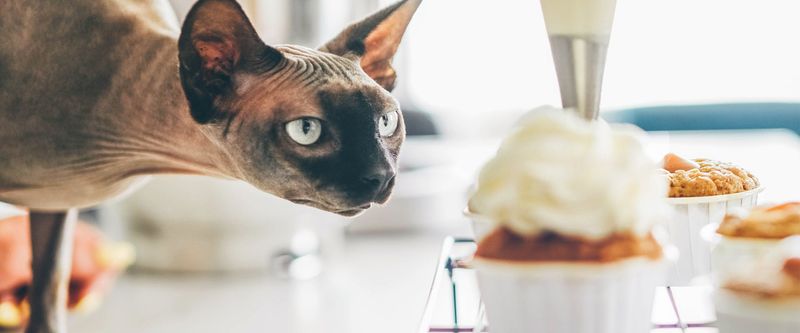📖 Table of Content:
- 1. Cooked Lean Meats
- 2. Fish
- 3. Eggs
- 4. Pumpkin
- 5. Plain Yogurt
- 6. Cooked Carrots
- 7. Bananas
- 8. Cooked Oatmeal
- 9. Cooked Squash
- 10. Cooked Green Beans
- 11. Cantaloupe
- 12. Cooked Spinach
- 13. Bone Broth
- 1. Chocolate
- 2. Onions and Garlic
- 3. Grapes and Raisins
- 4. Caffeine
- 5. Alcohol
- 6. Raw Dough
- 7. Xylitol
Cats often show interest in human meals, drawn by the smells and sounds of food being prepared or eaten. Their curiosity can be endearing, but it also raises questions about what’s safe to share. Despite their picky reputations, some cats will eagerly beg for a bite of whatever is on the table.
While certain human foods can be offered in small, safe amounts, others pose serious health risks. Cats have unique nutritional needs and sensitive digestive systems that don’t tolerate all ingredients. Knowing the difference between a harmless treat and a potential toxin is crucial.
Offering the wrong food can lead to digestive upset or even long-term health problems. Ingredients that seem harmless to humans—like garlic, chocolate, or certain fats—can be dangerous for cats. A thoughtful approach to sharing food ensures their safety and well-being.
1. Cooked Lean Meats
Protein-packed chicken, turkey, and beef make excellent occasional treats for your carnivorous companion. These meats align perfectly with your cat’s natural dietary preferences.
Always serve these meats plain—no salt, spices, or sauces. Remove all skin, bones, and fat before offering small, bite-sized pieces to your furry friend.
Cooking thoroughly eliminates harmful bacteria like Salmonella. Remember to keep portions modest, as these treats should complement, not replace, their regular balanced cat food.
2. Fish
Few things grab a cat’s attention like the smell of tuna or salmon. These fish are packed with omega-3s, which help keep skin soft and coats glossy. It’s a delicious way to support their health.
Serve fish cooked and boneless to prevent choking hazards. Avoid raw fish, which may contain thiaminase, an enzyme that destroys essential B vitamins.
Moderation is key—too much fish can lead to mercury exposure or thiamine deficiency. Consider fish an occasional treat rather than a dietary staple for your whiskered companion.
3. Eggs
Who knew eggs could be a gourmet delight for cats? Whether scrambled or hard-boiled, they’re loaded with protein and amino acids cats need. The subtle flavor and velvety texture often win over even the most discerning feline palate.
Never serve raw eggs, as they pose salmonella risks and contain avidin, which interferes with biotin absorption. Cook eggs thoroughly without butter, oil, salt, or seasonings.
The protein in eggs supports muscle maintenance, while B vitamins contribute to overall health. Offer just a small spoonful as an occasional treat, not as a meal replacement.
4. Pumpkin
When your cat’s tummy is out of balance, plain cooked pumpkin can be a calming solution. Packed with fiber, it helps regulate bowel movements, whether your cat is struggling with constipation or diarrhea.
Canned plain pumpkin offers convenience, but ensure it contains no additives, spices, or sugar. Most cats enjoy the mild, sweet flavor, making it an easy addition to their regular food.
Start with just a teaspoon mixed into their regular meal. Pumpkin also provides beneficial vitamins like A and C, supporting immune function and vision health.
5. Plain Yogurt
Unsweetened, plain yogurt offers beneficial probiotics that support digestive health. Many cats can tolerate small amounts despite being somewhat lactose intolerant as adults.
The active cultures in yogurt help maintain healthy gut bacteria. Opt for full-fat, plain varieties without artificial sweeteners, especially xylitol, which is toxic to pets.
Limit servings to a teaspoon once or twice weekly. If your cat shows signs of digestive upset after eating yogurt, discontinue immediately, as some felines are more sensitive to dairy than others.
6. Cooked Carrots
Carrots aren’t just for bunnies—when cooked and mashed, they’re a safe, nutritious snack for curious cats. Packed with beta-carotene that converts into vitamin A, they help keep eyes sharp and immunity strong. Plus, the mellow flavor and silky texture may just win over a feline palate.
Steam or boil carrots until very soft, then mash or puree them without added salt, butter, or seasonings. Cats lack the enzymes to break down plant cell walls effectively, so proper cooking is essential.
Offer just a half-teaspoon as an occasional treat. While not a natural part of feline diets, properly prepared carrots can be a healthy supplement to their regular food.
7. Bananas
A small serving of mashed banana delivers potassium, vitamin B6, and gentle sweetness. Its smooth texture makes it easy for cats to eat. While not every cat enjoys fruit, some are happy to give it a try.
Keep portions extremely small—think pea-sized—as cats don’t need fruit in their diet. Some felines may be attracted to the unique smell and consistency of this yellow fruit.
Bananas contain natural sugars, so they should remain an infrequent treat. If your cat shows interest, this safe fruit option makes a harmless way to share snack time together occasionally.
8. Cooked Oatmeal
Plain cooked oatmeal provides soluble fiber that can benefit cats with irregular digestion. The bland taste and soft texture make it palatable for some felines.
Always serve oatmeal plain—no milk, sugar, salt, butter, or flavors. Cook with water until very soft, and cool completely before offering a small spoonful.
While cats don’t require grains, small amounts of oatmeal occasionally won’t harm healthy cats. The B vitamins and fiber may provide modest nutritional benefits as an occasional supplement to their regular diet.
9. Cooked Squash
Cooked until tender, butternut, acorn, and summer squashes offer a healthy mix of vitamin A, potassium, and fiber. Their mild flavor and creamy texture can tempt curious cats looking for something new.
Boil or steam squash without seasonings until it’s easily mashed with a fork. Cool completely before offering a small teaspoon as a treat or food topper.
The high water content in squash can help increase hydration, especially beneficial for cats who don’t drink enough water. Like other vegetables, squash should only be an occasional addition to a meat-based feline diet.
10. Cooked Green Beans
Trying to help your kitty slim down? Steamed green beans bring crunch, fiber, and flavor—all without the extra calories. Just chop them small and serve as a guilt-free veggie snack.
Serve plain with no salt, butter, or seasonings. Many cats enjoy batting around and playing with the bean pieces before eating them, providing both mental stimulation and nutrition.
The fiber content helps cats feel full while adding minimal calories to their diet. For overweight cats, green beans can substitute for a small portion of their regular food with veterinary approval.
11. Cantaloupe
Small bits of cantaloupe flesh (no seeds or rind) intrigue many cats with their sweet scent and taste. The melon’s strong aroma contains compounds similar to those in meat, explaining the unexpected feline attraction.
Rich in antioxidants and beta-carotene, cantaloupe supports immune health when offered in tiny amounts. The high water content provides additional hydration benefits during hot weather.
Keep portions minimal—a small fingernail-sized piece is plenty. While cats don’t need fruit in their diet, this safe melon can be an occasional bonding treat for curious kitties.
12. Cooked Spinach
Finely chopped cooked spinach offers iron, vitamins A, C, and K when served occasionally. The dark leafy greens should be thoroughly steamed or boiled to break down the cell walls.
Moderation is crucial with spinach due to its oxalate content, which could potentially contribute to crystal formation in predisposed cats. Limit to tiny portions once or twice monthly.
Mix a quarter-teaspoon into regular food rather than serving alone. Most cats won’t actively seek out spinach, but some may accept it mixed with more appealing proteins like chicken or fish.
13. Bone Broth
Homemade bone broth without onions, garlic, or salt provides collagen, minerals, and irresistible flavor. The rich aroma entices even picky eaters, making it perfect for cats needing extra hydration.
Prepare by simmering plain chicken, turkey, or beef bones in water for several hours. Skim off all fat after cooling and remove all bones before serving.
Offer room-temperature broth in a separate dish or drizzle over regular food. The gelatin in properly made bone broth may support joint health in older cats while encouraging increased fluid intake.
1. Chocolate
That sweet piece of chocolate might be a treat for humans, but it’s dangerous for cats. Theobromine and caffeine can overwhelm their system, leading to vomiting, tremors, or even seizures. Just a little can do a lot of harm.
Dark and baking chocolates pose the greatest danger due to their higher theobromine concentration. While cats rarely seek out sweet foods, chocolate-flavored dairy products might tempt them.
Symptoms of chocolate poisoning include restlessness, increased urination, and muscle tremors. If you suspect your cat has consumed any chocolate, contact your veterinarian immediately as this requires prompt medical attention.
2. Onions and Garlic
All forms of onions, garlic, chives, and leeks contain compounds that damage feline red blood cells, potentially causing anemia. These allium family plants are toxic whether raw, cooked, powdered, or even in small amounts in broths and baby foods.
Symptoms of poisoning may not appear immediately. Watch for lethargy, weakness, reduced appetite, pale gums, and orange-to-dark red urine.
Many prepared human foods contain these ingredients, so check labels carefully. Never use garlic as a natural flea treatment for cats—this dangerous myth could seriously harm your pet.
3. Grapes and Raisins
They may seem harmless, but grapes and raisins can be dangerously toxic to cats. The reason behind their effects is still a mystery, but the outcome can be severe. Even one grape could pose a risk to a sensitive feline.
Early signs of poisoning include repeated vomiting and hyperactivity, followed by lethargy, reduced urination, and dehydration. All grape varieties, including seedless and those in baked goods, pose this danger.
Keep all grape products securely away from curious cats. If ingestion occurs, consider it an emergency requiring immediate veterinary care, as prompt treatment significantly improves outcomes.
4. Caffeine
Coffee, tea, energy drinks, and chocolate contain caffeine that overstimulates cats’ nervous and cardiac systems. Their small bodies cannot process this stimulant effectively, leading to serious health issues.
Symptoms of caffeine toxicity include restlessness, rapid breathing, heart palpitations, muscle tremors, and seizures. Even small amounts can cause these dangerous effects in cats.
Keep coffee grounds, tea bags, and caffeinated beverages safely away from curious paws. If your cat consumes anything containing caffeine, contact your veterinarian immediately as this constitutes a medical emergency.
5. Alcohol
Alcoholic beverages pose serious dangers to cats, affecting their liver and brain much more severely than humans. Even small amounts can cause toxic reactions due to their tiny body size and inability to metabolize alcohol.
Symptoms of alcohol poisoning include disorientation, vomiting, elevated body temperature, and in severe cases, seizures, respiratory failure, or coma. Mixed drinks with cream or milk might particularly attract cats.
Never leave alcoholic drinks unattended around pets. If accidental consumption occurs, treat it as an emergency requiring immediate veterinary intervention to prevent potentially fatal outcomes.
6. Raw Dough
Yeast-containing raw dough is hazardous for cats, as it continues to rise once ingested. The expanding dough can lead to gastric distension or obstruct the intestines. Prompt medical attention is often required in such cases.
Second, fermenting yeast produces alcohol, leading to ethanol poisoning with symptoms like disorientation, vomiting, and seizures. The rising dough can also release gas that may cause the stomach to twist—a life-threatening emergency.
Keep all raw dough safely out of reach during baking projects. If your cat consumes any, contact your veterinarian immediately rather than waiting for symptoms to develop.
7. Xylitol
This artificial sweetener found in sugar-free gum, candy, baked goods, and some peanut butters causes rapid insulin release in cats. The resulting hypoglycemia (low blood sugar) can develop within minutes to hours after ingestion.
Symptoms include vomiting, loss of coordination, lethargy, seizures, and potentially liver failure. Products labeled “sugar-free” or “no sugar added” may contain this dangerous substance.
Check ingredient lists carefully on human foods before sharing with pets. Xylitol may also appear as “birch sugar” on labels. If you suspect your cat has consumed anything containing xylitol, seek emergency veterinary care immediately.
